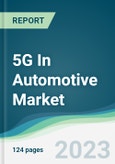GROWTH DRIVERS
The 5G in the automotive industry market is driven by the demand for connected car technology, multimedia services, software-defined vehicles, and government initiatives to curb road accidents and improve road safety that leverage the high-speed and low-latency network. 5G technology can enable EVs and NEVs to have features such as real-time navigation, infotainment systems, advanced driver-assistance systems, fleet management, and vehicle-to-everything (V2X) communication solutions that can improve the safety, convenience, and entertainment of drivers and passengers. Moreover, fast chargers can reduce the charging time and range anxiety for EVs and NEVs users, making them more competitive and appealing than conventional vehicles.China is one of the leading countries in the world in terms of 5G network deployment and application. For instance, according to the report “Global EV Outlook 2022” released by International Energy Agency, the fast publicly accessible chargers in China were 215 thousand in 2019, 309 thousand in 2020, and 470 thousand in 2021. This demonstrates the nation's commitment to assisting the switch to electric mobility since it is one of the world's largest electric vehicle charging networks. Fast chargers can offer new services and capabilities through 5G connectivity, reducing EV owners' charging time and concerns. The rising China’s deployment of fast, publicly accessible chargers can boost the growth of 5G in the automotive industry by providing additional options and convenience for EV owners. Additionally, the development of fast chargers can foster cross-industry collaboration for intelligent and connected vehicles.
EMERGING OPPORTUNITIES FOR 5G IN AUTOMOTIVE INDUSTRY MARKET
HARDWARE AND SERVICES
The 5G in automotive market is driven by the demand for connected car technology that offers real-time navigation, infotainment, driver assistance, and fleet management features. It also benefits from the adoption of multimedia services in passenger transportation and the trend of software-defined vehicles that enable subscription-based or on-demand services and enhanced safety. Moreover, the government initiatives to improve road safety by using V2X communication solutions also boost the market growth.By component, the 5F in automotive industry market is segmented into hardware, software, and services. These segments of the 5G in automotive industry market are witnessing various innovations and collaborations from different players in the industry.
For instance,
- In August 2021, General Motors announced its plan to deploy a next-generation automobile network in the near future with AT&T. The company declared that starting with the 2024 model year, its first vehicles will feature a 5G connection. According to the firm, the network and technologies included in upcoming automobiles will expressly cater to the requirements of the automaker's upcoming electric and autonomous vehicles.
- In May 2020, Huawei Technologies announced that it had joined forces with 18 Chinese manufacturers to create a "5G automobile ecosphere" to speed the commercialization of next-generation 5G in the automotive industry. Huawei will supply these manufacturers with technologies for testing 5G-enabled automobiles.
GEOGRAPHICAL PRESENCE
The global 5G in automotive market consists of major countries making efforts to secure their 5G network. Americas is expected to have a higher CAGR during the forecasted period. In addition, a few major countries include the USA, Japan, South Korea, China, United Kingdom, and Germany. The nations have undertaken various steps further complementing the overall market growth. For instance,- In June 2023, in the United Kingdom, the country's technology minister announced its investments as part of the government’s Transport Research and Innovation Grant (TRIG) Programme. The investments worth 1.96 million euros will be dispersed for 67 innovative projects developing transport technology.
- In March 2022, in the United States, T-Mobile unveiled Magenta Drive for BMW and the first connected 5G cars in the United States. As part of a long-term partnership to provide unlimited voice calling and unlimited 5G data to BMW vehicles, T-Mobile will provide its new Magenta Drive for the newly launched America's first 5G connected vehicles, “BMW iX and i4” by BMW.
- In June 2019, in Germany, e.GO announced its commencement of producing 5G vehicles. The Aachen facility of German electric microcar manufacturer e.GO Mobile AG has started building automotive 5G components by leveraging 5G connectivity from Vodafone Germany and Ericsson.
MAJOR PLAYERS IN THE MARKET
Some of the leading players in the market include Ericsson and Verizon among others. The product offerings of the major corporation include the following:- Ericsson offers 5G RAN Slicing that provides customized and segregated virtual networks. 5G RAN Slicing enables the establishment of customized and segregated virtual networks for various Vehicle to Everything (V2X) applications, such as increased transportation fluidity, comfort, and safety on the road. Additionally, 5G RAN Slicing can offer various service qualities and performance levels for various use cases and traffic types in the automotive industry.
- Qualcomm Inc offers C-V2X which provides 5G NR features. The transition to 5G NR-based C-V2X will add new and complementing features for autonomous driving to Rel-14 while ensuring backward compatibility. It will combine 5G NR features, such as high throughput, decreased latency, and ultra-reliable communication capabilities, to support direct communications and enable enhanced use cases for autonomous vehicles.
- Verizon offers 5G Edge applications required to run fully autonomous vehicles. Many applications required to run fully autonomous vehicles can be supported using edge computing that operates close to real-time and keeps data local. The company’s 5G Edge enables Cellular Vehicle-to-Everything (C-V2X) computing capabilities.
SEGMENTATION
By Component
- Hardware
- Software
- Services
By Application
- Vehicle-to-everything (V2X)
- Infotainment and Telematics
- Fleet Management
By Geography
- Americas
- USA
- Others
- EMEA
- Germany
- UK
- Others
- APAC
- China
- Japan
- South Korea
- Others
Table of Contents
Companies Mentioned
- Audi
- BMW Group
- Bosch
- Ericsson
- Nokia
- Qualcomm Inc
- Verizon
- Volkswagen








